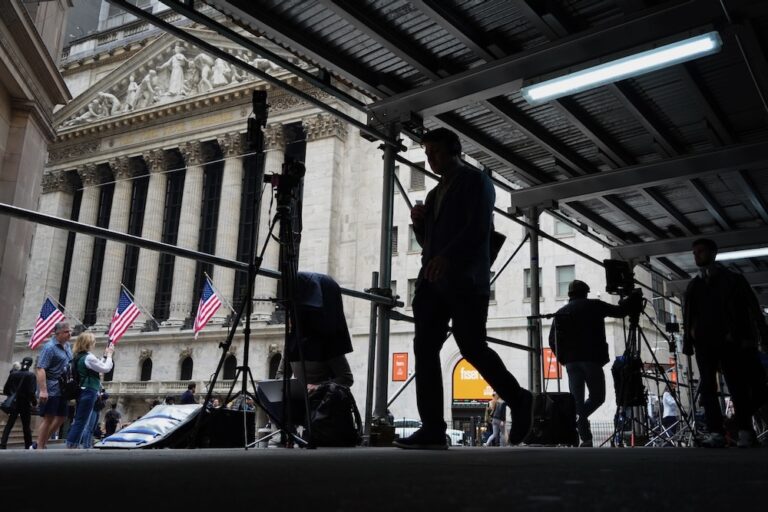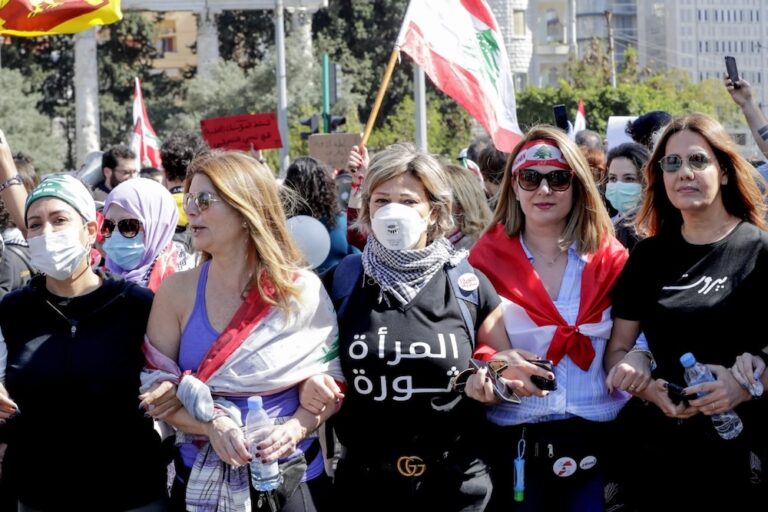In an era of rising authoritarianism and division, IFEX members are proving that solidarity, collaboration, and connection are the foundation for lasting change.
As a highly collaborative network of over 100 independent civil society organisations working on a broad range of free expression and information issues at the national, regional, and international levels all around the globe, IFEX is an effective force for positive change in a rapidly changing world. We share here examples of our work strengthening this unique network in 2024.
Network Building
Freedom can only be experienced alongside others; it rests on our intrinsic need for connection and community. In a world that is becoming increasingly fragmented, working with diverse others is a necessary condition to tackle our most pressing challenges.
In 2024 IFEX members and allies continued to creatively find ways to virtually connect and engage, reinforcing our model for meaningful interaction that is based on trust, collaboration, and respect. The IFEX General Meeting and Convening reunited the network and its allies in person, creating a precious opportunity to spend time together and collectively embody the network’s core values.
Walking the talk: Our commitments to collaboration
Just and sustainable social change involves many and diverse stakeholders, as together we become greater than the sum of our parts. IFEX’s 2023 Collaboration Code Report showed that collaboration is both increasingly necessary and increasingly difficult in a fragmenting global order.
To continue leading by example and exploring systemic, collaborative, and creative approaches to meet the challenges of our time, in 2024 we developed and shared a set of action-oriented tools – based on the Report’s findings – that leverage best practices and enable a collaborative culture. They are:
- The Collaboration Principles: a practical framework, centred on IFEX’s mission and values, to guide members in fostering genuine, effective collaboration and overcoming challenges through reflection, trust, and open experimentation.
- The Collaboration Checklists for Civil Society Organisations: a tool designed to help with internal assessment and action planning on how to work together.
This work on collaboration is also shining a light on practices that perpetuate power imbalances between civil society organisations (CSOs), a necessary step as we advance in our commitments to decolonial practices and social justice.
Come together! IFEX 2024 Convening & General Meeting

Participants of the IFEX 2024 Convening in Berlin.
More than 100 member organisations from around the world gathered in Berlin in April 2024 as IFEX held its first face-to-face network meeting since the onset of the COVID-19 pandemic.
The Convening provided important opportunities to explore pressing issues together, fuel our collective imaginations, and create meaningful opportunities for exchange between IFEX members and allies.
IFEX designed the event to foster and deepen personal connections across the network through relationship-oriented interactions. Departing from a ‘sit and listen’ type of conference, the agenda prioritised ‘corridor conversations’ – informal exchanges hosted by members. These spaces allowed participants to propose topics and invite others to share their ideas, experiences, successes, and struggles. Member-driven conversations covered topics such as surveillance of digital activists, international support for a democratic and inclusive society in Myanmar, countering toxic polarizing narratives, and strategies for when advocacy fails.
The Convening was also an opportunity to strengthen collaboration with allies. We partnered with the Business and Human Rights Resource Center to host a session on how to engage with the corporate sector to move the needle on FoE&I rights. We also collaborated with Global Partners Digital in the design and facilitation of two sessions focused on digital governance.
Our commitment to the essential messiness of human connection, the unpredictability of relationships, and the humility of shared learning shaped a convening where activities like dance warmups, drumming, and meditation were part of the agenda. To experiment with new tools to strengthen relationships, we also developed an app to support connections and spark exchanges.
Regional Networking
While in Berlin for IFEX’s GM and Convening, the African Freedom of Expression Exchange (AFEX) network, the IFEX Latin America & Caribbean Alliance (IFEX-ALC), and IFEX members working in the Middle East and North Africa met with their regional colleagues to discuss priorities, capacities, and potential opportunities for working together moving forward. On the agendas: How to bolster members’ advocacy efforts, best practices for advancing journalists’ safety, addressing funding crises, censorship, and the harm caused by regional conflicts and violence.
IFEX-ALC | Celebrating 15 years
For IFEX-ALC, the gathering was a chance to celebrate its 15th anniversary and acknowledge its many achievements. It was also an opportunity to collectively re-examine what their priorities should be in the face of rising authoritarianism, polarisation, and diminishing resources for CSOs in the region. Building on efforts initiated during their meeting in Mexico City in 2023, they continued work on a strategic Route Map for IFEX-ALC under the umbrella of IFEX’s Strategic Plan. The Route Map provides a streamlined structure for guiding IFEX-ALC members’ shared priorities and emphasises the need to tap into member’s knowledge and experiences to strengthen the network with their leadership.
AFEX | Mentorship and collaboration for change
IFEX members in Africa discussed strategic initiatives and explored ways to bring more collaborative approaches to advocacy. One opportunity identified was to increase the network’s regional impact by producing unified reports for regional and international bodies. Members with extensive experience of regional mechanisms expressed their willingness to share best practices and mentor others, creating a valuable learning opportunity within the network. Two non-AFEX members – Namibia Media Trust and Paradigm Initiative – also joined the meeting, offering fresh perspectives and fostering cross-sector partnerships. A new Steering Committee was also elected, forging a refreshed leadership team from the AFEX membership.
MENA | Solidarity and support
The MENA regional meeting provided a space for members to discuss some of the unique hurdles they face, the many facets of oppression in the region, and the grave situation in Palestine. Topics were sourced from members ahead of the meeting, helping ensure a focus on the most pressing issues: building alliances and enhancing their advocacy efforts, documenting violations against journalists, and tackling challenges to accessing international funding and registering in foreign countries.
Enhanced network resilience and vision
The acute and devastating shifts within key funding bodies have resulted in loss of critical resources for CSOs working on FoE&I. IFEX continues to support the institutional development of members through tailored and flexible assistance, exploring new ways to respond to the very difficult funding ecosystem that members – and the network – are facing.
IFEX offers a system of support to strengthen members’ organisational capacities and their ability to adapt to changing circumstances. Our long-term relationships with members allow for transparent conversations as well as flexibility and responsiveness, which have proven crucial in a volatile and uncertain environment.
Collaboration in Action | Joint funding proposals
New forms of collaboration are helping us unlock access to funding streams that would otherwise be unavailable to members.
Last year IFEX produced concept notes and proposals in partnership with members on several occasions, including joint applications for funding – something we had done little of before.
When pursuing these opportunities, we focus on the synergies and complementarities that arise from working together. This involves leveraging an understanding of the unique knowledge and experiences that each member brings to the table, aligning our goals, and establishing an approach that enables mutual trust and accountability.
Recognising that this and other forms of collaboration are becoming increasingly important to resource civil CSOs in upcoming years, IFEX is strategically experimenting with these new forms of partnership.
Unbundling strengths to explore new opportunities | Bolivia
The Asociación Nacional de la Prensa (ANP) has been working on the defense and promotion of FoE&I in Bolivia for decades. As attacks against the press have increased, ANP’s work has become even more critical.
In 2024 IFEX supported ANP to identify new areas of work to expand into and opportunities to diversify their funding sources, to contribute to their financial sustainability. The grant enabled ANP to combine training opportunities for their team with coaching from a fundraising expert. They were able to articulate their unique strengths, develop a donor map, and prepare new projects that transferred their strengths and knowledge to new funding streams.
One outcome of this process was a decision to include a more active gender perspective in their work, including through the provision of services such as legal support, psychological support, and special assistance to women journalists. They would be able to build on their prior experience training indigenous women from rural populations to strengthen their news reporting and radio-broadcasting practices.
“We thank IFEX for supporting an institutional transition process that will help improve the strengths of the ANP to continue working for the defense of human rights and press freedom in Bolivia.” Asociación Nacional de la Prensa (ANP)
A vision informed by equity and inclusion | MENA
The Gulf Centre for Human Rights (GCHR) provides support and protection to human rights defenders in the MENA region, with an emphasis on Gulf Cooperation Council (GCC) member countries, while enabling CSO connections with the international community. In 2024 IFEX supported a GCHR project to assess their equity and inclusion practices and incorporate that lens into its strategic plan and theory of change.
IFEX connected GCHR with a Lebanon-based consultant who conducted an audit of their practices that revealed a strong commitment to diversity and inclusion. The audit also highlighted areas for improvement such as clearer policies, better communication channels, and more engagement with diverse groups in politically restricted regions.
Following the audit, a staff and board retreat in Lebanon was planned to incorporate these learnings into GCHR’s Strategic Plan. However, safety risks arising from Israeli attacks on Lebanon led to postponing the retreat several times. GCHR was finally able to meet in May, providing an opportunity to come together, support one another, and express solidarity with staff and board members living in Lebanon.
“We appreciate the flexibility of IFEX to extend the grant’s timeline and scope, especially given the war impacting Lebanon and our staff who are based there” Gulf Centre for Human Rights (GCHR)
Enhancing financial sustainability | Liberia
Challenges regarding freedom of expression and peaceful assembly still impact full and free participation in Liberia’s civic space. The Center for Media Studies & Peace Building (CEMESP) works to foster democratic accountability and promote an open civic space through the promotion of free media, but there are many obstacles to resourcing the work.
In 2024, IFEX provided CEMESP with funds to enhance its financial sustainability. CEMESP engaged with a fundraising expert who supported the team in securing a European Union grant for the Liberia Media Empowerment project. This initiative will assure its ability to engage with diverse stakeholders and continue mobilising resources to strengthen the work of media professionals as well as of peacebuilding and human rights organisations.
Click here to check out IFEX’s 2024 Annual Report: Forging Collective Resistance.



